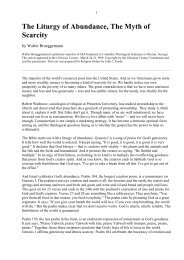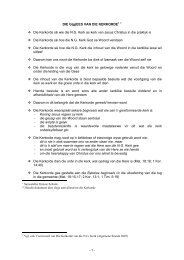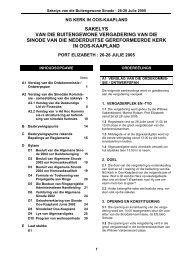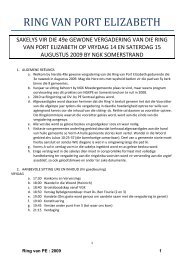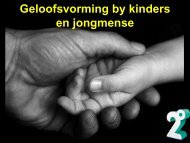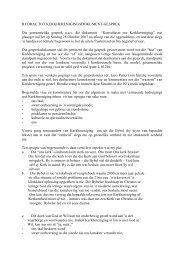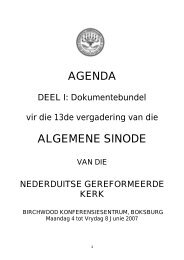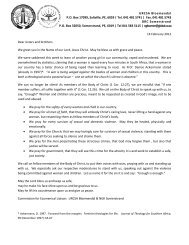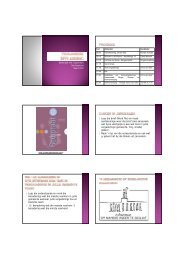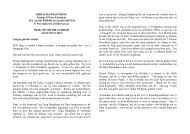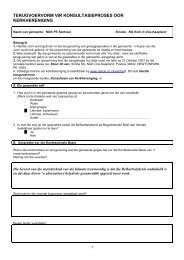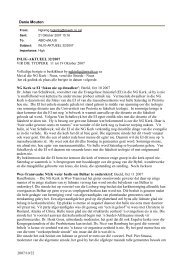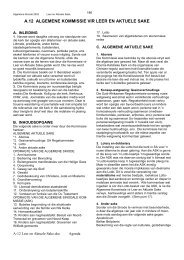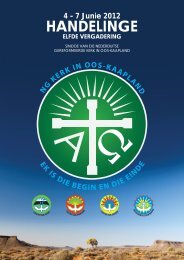BelharBelydenis - NG Kerk in Oos-Kaapland
BelharBelydenis - NG Kerk in Oos-Kaapland
BelharBelydenis - NG Kerk in Oos-Kaapland
You also want an ePaper? Increase the reach of your titles
YUMPU automatically turns print PDFs into web optimized ePapers that Google loves.
Die “ons” wat glo wil se dat dit nie ‘n enkele<br />
persoon is wat hier bely nie, maar die kerk.<br />
Aan die beg<strong>in</strong> was dit natuurlik die<br />
belydende <strong>NG</strong> Send<strong>in</strong>gkerk <strong>in</strong> 1986, maar<br />
uite<strong>in</strong>delik wil Belhar ‘n belydenis vir die kerk<br />
op alle plekke en nof tot ver <strong>in</strong> die toekoms.<br />
wat deur sy Woord en Gees sy <strong>Kerk</strong><br />
versamel, beskerm en versorg van die<br />
beg<strong>in</strong> van die wêreld af tot die e<strong>in</strong>de toe<br />
Hierdie is ‘n direkte aanhal<strong>in</strong>g van HK vr en<br />
antw 54: “Wat glo jy van die heilige,<br />
algemene, Christelike kerk? Dat die Seun<br />
van God… deur sy Gees en Woord ‘n<br />
gemeente van die beg<strong>in</strong> van die wereld af<br />
tot die e<strong>in</strong>de toe vergader, beskerm en<br />
onderhou…”<br />
Die band tussen die Drie-Enige God en die<br />
gelowiges – die ou en nuwe Israel - loop<br />
soos ‘n goue draad deur die hele Bybel.<br />
Jawhe, die God van Abraham, Isak en<br />
Jakob, is nie te bed<strong>in</strong>k sonder sy volk nie<br />
(Gen 12; Hosea 11). Net so is die werk van<br />
Jesus Christus en die Heilige Gees nou aan<br />
die kerk <strong>in</strong> die Nuwe Testament verb<strong>in</strong>d<br />
(Hand 1:8; 2:1-13; Kol 1:18) .<br />
Hierdie band tussen God en die kerk is ook<br />
daar <strong>in</strong> die belydenisse van die vroeë kerk:<br />
geloof aan die kerk kom altyd direk na die<br />
geloof <strong>in</strong> die Vader, Seun en Heilige Gees.<br />
By Nicea is die kerk ‘n onderdeel van ons<br />
geloof <strong>in</strong> die Heilige Gees.<br />
In HK vraag en antwoord 54, word God<br />
deur Sy Woord en Gees aan die kerk<br />
geb<strong>in</strong>d. Dis hoe God sy kerk bymekaar<br />
br<strong>in</strong>g. Die kerk is dus duidelik nie van ‚n<br />
menslike maaksel nie. Ons moet die kerk<br />
dus altyd sien as God se werk. Die kerk is<br />
daar om God te eer en nie <strong>in</strong> die eerste plek<br />
om mense se behoeftes te bevredig nie. Dis<br />
ook hoe Dordt I,7 juis oor die uitverkies<strong>in</strong>g<br />
bely.<br />
Dat God sy kerk nie net versamel nie, maar<br />
ook beskerm en versorg, sê dat die kerk<br />
altyd weer <strong>in</strong> gevaar kan kom. Dit wys reeds<br />
vooruit na artikel 5 wat praat van<br />
gehoorsaamheid wat tot stryd en lyd<strong>in</strong>g kan<br />
lei. Dit was dan ook so <strong>in</strong> Suid-Afrika as<br />
mens kyk na die tyd waaruit die belydenis<br />
kom. En dis vandag nog so dat<br />
gehoorsaamheid aan die evangelie stryd en<br />
lyd<strong>in</strong>g br<strong>in</strong>g - hier en op verskillende plekke<br />
<strong>in</strong> die wêreld.<br />
Dat die kerk egter veilig is, berus nie op<br />
haar eie planne of pog<strong>in</strong>gs om haarself te<br />
beskerm nie. Die kerk is veilig omdat Jesus<br />
Christus, die Hoof, ‘n ewige Kon<strong>in</strong>g is “wat<br />
nooit sonder onderdane kan wees nie”<br />
(<strong>NG</strong>B art 27). Christus is die Alfa en Omega<br />
(Openbar<strong>in</strong>g 22:13). Dis daarom Hy wat<br />
bewaar van die beg<strong>in</strong> van die wereld af<br />
(alfa) tot die e<strong>in</strong>de toe (omega).<br />
Belydenis van Belhar ● Belhar Confession ● Isivumo SaseBelhar<br />
8 – 11, HC 8 and the Canons of Dort 1, 7.<br />
The above given “we” wish to <strong>in</strong>dicate that it<br />
is not one person who is confess<strong>in</strong>g here,<br />
but the church. Of course, <strong>in</strong> the beg<strong>in</strong>n<strong>in</strong>g<br />
<strong>in</strong> 1986 it was the DR Mission Church who<br />
was confess<strong>in</strong>g, but eventually Belhar wants<br />
to be a confession for the whole church<br />
everywhere and then also far <strong>in</strong>to the future.<br />
Who gathers, protects and cares for his<br />
Church by his Word and his Spirit, as He<br />
has done s<strong>in</strong>ce the beg<strong>in</strong>n<strong>in</strong>g of the<br />
world and will do to the end<br />
This is a direct quotation of the HC, question<br />
and answer 54: “What do you believe of the<br />
holy catholic Church? That the Son of God<br />
… from the beg<strong>in</strong>n<strong>in</strong>g to the end of the<br />
world, gathers, defends, and preserves for<br />
Himself … by His Spirit and Word … a<br />
Church chosen to everlast<strong>in</strong>g life… ”<br />
The bond between the Triune God and all<br />
believers – the old and new Israel – runs like<br />
a golden thread right through the entire<br />
Bible. Jawhe, the God of Abraham, Isaac<br />
and Jacob, is not to be thought of without<br />
his people (Gn 12; Ho 11). Likewise, the<br />
work of Jesus Christ and the Holy Spirit is<br />
closely associated with the church <strong>in</strong> the<br />
New Testament (Acts 1:8; 2:1-13; Col<br />
1:18).<br />
This bond between God and the church is<br />
also present <strong>in</strong> the creeds of the early<br />
church: faith <strong>in</strong> the church comes directly<br />
after faith <strong>in</strong> the Father, Son and Holy Spirit.<br />
In the Nicene Creed the church is a<br />
component of our faith <strong>in</strong> the Holy Spirit.<br />
In HC question and answer 54, His Word<br />
and Spirit b<strong>in</strong>d God to the church. This is<br />
how God br<strong>in</strong>gs his church together. So the<br />
church is def<strong>in</strong>itely not the work of humans.<br />
Therefore we should always see the church<br />
as the work of God. The church exists to<br />
honour God and not, <strong>in</strong> the first place to<br />
satisfy the needs of man. And that is also<br />
what the Canon of Dort 1, 7, confesses<br />
about the Election.<br />
This, that God not only gathers his church<br />
together, but also defends and preserves his<br />
church, implies that the church may always<br />
be subject to danger. This also po<strong>in</strong>ts to<br />
article 5, which says that obedience to God<br />
may lead to struggle and suffer<strong>in</strong>g. This<br />
was the situation <strong>in</strong> South Africa if one looks<br />
at the background and time whence this<br />
Confession comes. And today it is still the<br />
same, that obedience to the gospel results<br />
<strong>in</strong> struggle and suffer<strong>in</strong>g – here and <strong>in</strong> many<br />
places <strong>in</strong> the world.<br />
The safety of the church does not rest with<br />
her own plans or efforts to defend herself.<br />
The church is safe because Jesus Christ,<br />
the Head, is an eternal K<strong>in</strong>g “ who can never<br />
be without subjects” (DCF article 27). Christ<br />
is the Alpha and Omega (Revelations<br />
22:13). For this reason, it is He who<br />
preserves from the beg<strong>in</strong>n<strong>in</strong>g of the world<br />
(alpha) to the end (omega).<br />
7<br />
lwethu ngokucacileyo kuloThixo oziqu zithathu<br />
emnye kwaza komelezwa kwisivumo-lukholo<br />
saseNetherlands kwiziqendu 8-11, iKhathikhezi<br />
yaseHeidelberg 8 nakwiimfundiso zaseDordt<br />
isahluko 1,7.<br />
U “si” okholwayo, uthetha ukuba ay<strong>in</strong>gomntu<br />
omnye ongq<strong>in</strong>a apha ukholo lwakhe kodwa<br />
yiCawe ngokubanzi. Ekuqaleni ibiyiCawe ye<strong>NG</strong><br />
Send<strong>in</strong>g engq<strong>in</strong>ayo kodwa ekugqibeleni isivumo-lukolo<br />
saseBelhar seseCawe ngokubanzi<br />
kuzo zonke i<strong>in</strong>dawo nakwixesha elizayo<br />
othi ngeLizwi lakhe nangoMoya wakhe<br />
aziqokelele iCawe eyeyakhe, aze ayikhusele<br />
ayilondoloze ukususela ekuqaleni<br />
kwehlabathi kuse esiphelweni.<br />
Oku kucatshulwe njengoko kunjalo<br />
kwiKhathikhezi yaseHeidelberg umbuzo<br />
nempendulo 54: “Ukhokelwe y<strong>in</strong>toni kwiCawe<br />
eNgcwele ekulo lonke ilizwe? Okokuba uNyana<br />
kaThixo ----- ngoMoya wakhe nangeLizwi lakhe<br />
waqokelela, wakhusela kwaye waxhasa iBandla<br />
lakhe kwasekuqaleni kwehlabathi kwada kwasa<br />
esiphelweni --”<br />
Unxulumano phakathi koThixo oziqu zithathu<br />
emnye kunye namakholwa – uSirayeli omdala<br />
nomtsha luhamba njengoc<strong>in</strong>go lwebhedu<br />
kwiBhayibhile yonke. UYehova uThixo<br />
kaAbraham, Isake noYakobi abanakwahlulwa<br />
nohlanga lwakhe (Gen.12; Hoseya 11).<br />
Njengoko kunjalo kumsebenzi kaYesu Krestu<br />
noMoya oyiNgcwele eCaweni yakalokunje<br />
kwiTestamente eNtsha (izenzo 1;8;2:1-13;Kol<br />
1:18).<br />
Olu nxulumano luphakathi koThixo neCawe<br />
yakhe lukhona kwizivumo-lukholo zeCawe<br />
yokuqala:Ukholo eCaweni luza emveni<br />
kokukholwa kuYise, kuNyana nakuMoya<br />
oyiNgcwele. Kwisivumo-lukholo saseNicea,<br />
iCawe isisahlulo sokholo lwethu kuMoya<br />
oyiNgcwele.<br />
Ikhathikhezi yase Heidelberg umbuzo<br />
nempendulo 54 uThixo uzimanya neCawe<br />
yakhe ngeLizwi lakhe kunye noMoya wakhe.<br />
Y<strong>in</strong>dlela uThixo ayidibanisa ngayo iCawe<br />
yakhe. Lo nto icacise ngokuphandle ukuba<br />
uThixo iCawe yakhe ayisekwangwa ngumntu.<br />
Kufuneka ngalo lonke lonke ixesha iCawe<br />
siyibone njengomsebenzi kaThixo.Icawe ikho<br />
ukuze imhlonele uThixo hayi ukuhlonela kuqala<br />
imiqweno yomntu. Kunjengoko iimfundiso<br />
zaseDordt 1,7 z<strong>in</strong>gq<strong>in</strong>a ngako.<br />
UThixo akayiqokelelanga nje iCawe yakhe,<br />
kodwa ukwayikhusela ayondle, kuthethe ukuba<br />
iCawe <strong>in</strong>gasoloko <strong>in</strong>gena engxak<strong>in</strong>i. Lo nto<br />
ibonise ngakumbi emva kwesiqendu 5 kuthetha<br />
ntoni ukuvisisana ekunokukhokela<br />
kukungavisisani. Bekunjalo nalapha eMzantsi<br />
Afrika xa umntu eqwalasela ngexesha<br />
lokwenziwa kwesi sivumo-lukholo. Kusenjalo<br />
unanamhla xa kuphulwa-phulwa kwiVangeli<br />
kuza ukungavisisani –apha nakwez<strong>in</strong>ya i<strong>in</strong>dawo<br />
ezahlukeneyo ehlabath<strong>in</strong>i.<br />
Ukuze iCawe ibe nokukhuseleka,<br />
akuxhomekekanga ekuzikhuseleni ngemigaqonkqubo<br />
yayo okanye ngemizamo yayo. ICawe<br />
ikhuseleke ngokuba uYesu Krestu eyiNtloko,<br />
eyiKumkani yaphakade “engasayi kuswela abo<br />
bayihlonelayo” (isivumo-lukholo<br />
saseNetherlands isiqendu 27). UKrestu<br />
unguAlfa noOmega (Izityhilelo22:13). Kungoko<br />
<strong>in</strong>guye okhuselayo kwasekuqalekeni<br />
kwehlabathi (Alfa) kude kuse ekupheleni<br />
(Omega)



